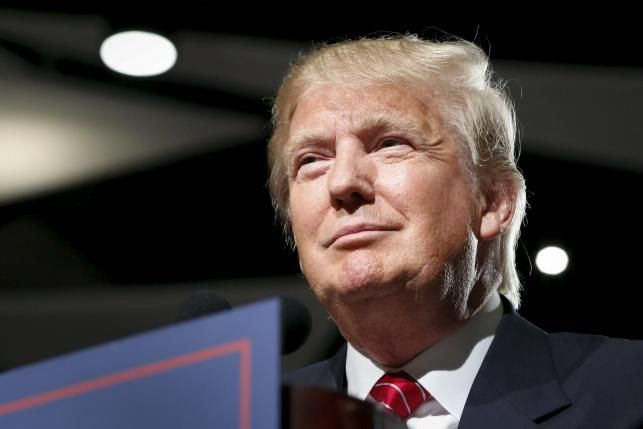Donald Trump Has Dominated TV Coverage Of 2016 Presidential Campaign For An Entire Month

During one of the dozens of segments last week covering ex-reality TV star and presidential candidate Donald Trump, CNN contributor and Democratic strategist Paul Begala declared that “Trump is God’s gift to the Democratic Party.”
“More Donald Trump,” he urged.
In reality, however, Trump is God's gift to TV news. So, CNN and the other cable and broadcast networks obliged and Trump continues to lead in the polls and in the minutes U.S. outlets are providing to the 2016 campaign. A fresh Washington Post-ABC News poll shows Trump leading the GOP pack at 24 percent among Republican voters, leaving Scott Walker and Jeb Bush far behind at 13 and 12 percent, respectively.
But as Trump has risen, so has the backlash: On Tuesday, the Des Moines Register demanded that the “self-absorbed, B-list celebrity” bow out of the race and put a stop to his “bloviating sideshow.”
Other outlets are turning inward and asking whether the press itself is responsible for the sideshow. The Washington Post’s Monkey Cage blog on Monday wrote simply, “Blame the media,” while a writer at the Daily Beast wrote that the incessant coverage of Trump by her peers “makes me want to die.”
Most notably, in a heavily publicized move on Friday, the Huffington Post decided to prove its seriousness by banishing Trump from the politics section, retiring him to the entertainment vertical. Yet entertainment stories can still make Huffington Post’s sprawling front page, so they're still harvesting Trump's clicks.
For his part, Trump has slammed the Huffington Post as an "illegitimate news source" and dismissed the Des Moines Register's "sophomoric editorial," citing his poll numbers.
More Minutes
How big is the media’s crush on Trump? On the network evening newscasts, Trump took up 37 percent of all coverage of the 2016 campaign since the beginning of June, according to analyst Andrew Tyndall. Of the three networks, NBC has covered the overall 2016 campaign most heavily (40 minutes vs. 19 on ABC, 21 on CBS), and has paid by far the most attention to the Trump campaign (21 minutes vs. 2 on ABC, 7 on CBS 7).
Jeb Bush was the second most heavily covered candidate with 15 minutes.
Exact numbers on cable news are harder to come by, but a look through the media monitoring service TV Eyes shows that Trump has earned coverage on CNN, MSNBC and Fox every day for the last week, outshining fellow front-runners Jeb Bush and Scott Walker by his number of mentions.
Paul, Rubio Sidelined
Other candidates such as Rand Paul and Marco Rubio had to sit and wait up to 24 hours at a time between their mentions on air, as candidates like Bobby Jindal and Carly Fiorina comparatively languished in the void. On TV, Election 2016 has a cast, and its leading man is Donald Trump.
Telling people not to blame Fox News, Buzzfeed ran a “loose estimate” of Trump coverage between CNN and MSNBC last week. Between July 6 and July 10, MSNBC mentioned Trump 400 times, while CNN mentioned him around 350 times, surpassing the mogul’s mentions on the conservative channel, according to the site. By comparison, Democratic front-runner Hillary Clinton chalked up less than 300 mentions on both networks.
Fox News is, in fact, the only channel where data in actual minutes is available: Liberal watchdog Media Matters had its researchers count up the time Trump has been getting compared to other candidates for the past three months.
'Trumpmania'
In June, Trump racked up one hour and 48 minutes of screen time, ahead of Rick Perry (and hour and 25 minutes) and Jeb Bush (52 minutes) on Fox. In May, Trump collected a whopping two hours and 39 minutes, surpassing Mike Huckabee at one hour and 33 minutes and Bush at one hour and 22 minutes. Since then, Trumpmania has only gotten hotter.
Other places, such as Nate Silver’s site Five Thirty-Eight, have taken a stab at answering whether all this coverage has driven Trump’s momentum. By Silver’s analysis, press coverage isn’t necessarily fueling the Trump boom, ("press attention both leads and lags public attention to the candidates"), but he still thinks the press should refuse to “feed the troll” and urged them to “deprive him of attention.”
Jane Hall, a professor of journalism and media studies at American University, says the media is, indeed, to blame for the surge.
“Absolutely the media are driving the coverage,” Hall told International Business Times.
Still, Hall expects Trumpmania to end as soon as he alienates enough people, and according to the Washington Post-ABC poll, Trump’s numbers did take a sharp dive after his comments on Sen. John McCain’s war service in Vietnam.
“Serious political journalists are right to be concerned about the attention he’s getting,” she said. “His surge has a lot to do with the outrageousness of his claims, because the media tends to find catnip in conflict.”
© Copyright IBTimes 2025. All rights reserved.






















